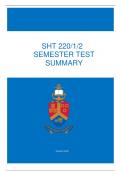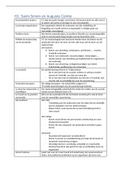Summary
SHT 220/1/2 Semester test Summary
- Institution
- University Of Pretoria (UP)
- Book
- Christian Theology
This is a summary of the material you need to study for the SHT 220/221/222 Semester test. All relevant themes and topics (as well as some additional topics) are summarised in these notes. Good luck!
[Show more]




